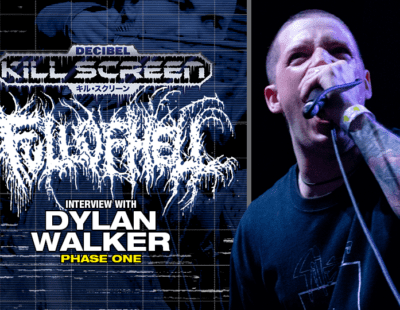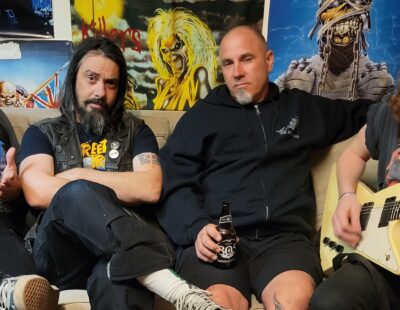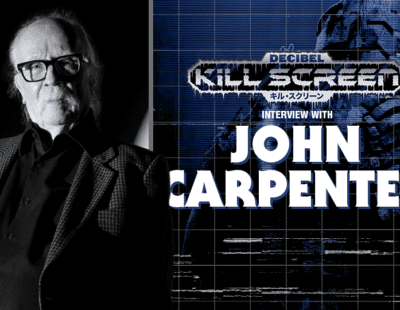
Belgium grinders Leng Tch’e are dropping their sixth album tomorrow, and the band has decided to take the bold move of giving the album—their first since 2010’s Hypomanic and the first to feature new drummer Olivier Coppens—the name Razorgrind, which is how they refer to their beefy, groovy grindcore. It’s an apt name for the sound and the album, which delivers the intensity that all Leng Tch’e fans will expect but with a few twists and turns that reveal themselves after a few listens; even after I rounded up bassist Nicolas Malfeyt and guitarist Jan Hallaert to pick their brains about the album I kept hearing more melodies, more little surprises. But it’s mainly Leng Tch’e through and through, rest assured. “I think we finally got the formula right both musically and sonically,” says Malfeyt. “But there’s always room for improvement,” he adds with a chuckle.

To me, the album is very Leng Tch’e; no huge surprises, which is not a bad thing. How do you feel it differs from your other albums?
Hallaert: This album is more straight-forward with more fast and groovy parts. I would say it’s less technical death metal, but more agressive. I also believe that our drummer, Olivier “Otis” Coppens, had a big impact on the sound. Olivier was 18 years old when he joined the band, and I gave him some different music to check out instead of the sometimes generic tech death he was listening to at that time. He soaked it all in, went to work by practicing hard and he quickly developed into a well-rounded drummer that can play many different styles, and he complements my writing style perfectly. Malfeyt: It’s definitely the best sounding album we’ve ever released. It’s just unrelenting punishment from start to finish. I can’t listen to it in the car or I’ll get in a road-rage incident for sure. As much as Jan and Olivier delivered the goods with the songs, it cannot be understated how much Serge [Kasongo] has stepped up in the vocal department. It’s like we have five singers in one.
Why call the album Razorgrind? I know that’s what you call your particular style of grind; why was the time now to name an album this?
Hallaert: To me, it was just time. This might possibly end up being our best album ever, who knows? Musically and visually, it’s a great balance of elements that made us use the term “razorgrind” in the past. Since we’re not living in the past, we challenged ourselves to take it up more than just a notch, yet still stay true to our own style. During a recent show, we secretly tried out about 10 songs off the new album, and it went great. Seeing everybody go apeshit to the new songs, hearing them for the first time, that says a lot to me and kind of confirms our feelings why we settled on Razorgrind as the title. Malfeyt: That’s exactly it. We feel this album embodies everything we’ve stood for since the beginning and we feel like we really nailed it. So it’s sort of a statement. This is razorgrind.
The song title “AnarChristic” is interesting; what is that one about?
Malfeyt: “AnarChristic” is about the dogma and political corruption of organized religion, and its negative impact on society, through science denial, for example.
What about “Magellanic Shrine”?
Malfeyt: Ooh, I love that song. Lyrically, it’s more of a metaphysical pondering of the universe and the energy that creates. Serge was on some mind-altering shit when he wrote that [laughs].
Speaking of that song, it’s one of the more unexpected moments on the album. Tell me about where that one came from musically.
Hallaert: Well, apart from the first album, all Leng Tch’e albums end with a slower song, or a song that has more build-up in it. In the last song on both Razorgrind and Hypomanic I tried to use all my unused riffs and ideas that are too long or too slow to fit in a “regular” Leng Tch’e song. Since I really liked those ideas a lot and wanted to get them on the album, I needed to use a different approach, which might not sit well with everybody. For “Magellanic Shrine” in specific, bands like Torche, Craft, Mastodon, and Integrity inspired me, and I can say that I put a lot of my own style in it as well. It’s always a big puzzle to see what fits together and what doesn’t, but I love to push the envelope by writing an epic closer for each album. Malfeyt: I really love that song.
You guys have been at this a long time. Working within the confines of a pretty strict genre, is it difficult to keep things fresh and interesting for yourselves?
Hallaert: That’s a great question. Razorgrind is already our sixth album, so naturally it should become harder not to repeat ourselves. Then again, we’ve seen a lot of bands change their style dramatically and still be amazing (or fail miserably). I don’t think Leng Tch’e will or should ever go a totally different route, largely because we have our own style since [2005’s] The Process of Elimination and we’re comfortable with it. Is it difficult? I would say it’s not. It’s more of a challenge and that keeps it interesting. I listen to a lot of different non-metal genres, so there’s always new elements I hear that want to “grindify.” Right now, I don’t feel like I’ll ever run out of ideas or lose my aggressive edge to write a hard-hitting song. I guess only time can tell if I will ever get too soft for this. Malfeyt: Having played with Jan for 13 years I can rest assured he will never run out of riffs. The man is a bottomless pit of brutality. In a way, actually, the strict confines of grindcore make it even more challenging to compose creative pieces of music, I think. In prog metal, for example, there’s more of an “everything goes” mentality where you can just branch off in complete virtuoso masturbation, which might be interesting for other musicians, but in my own opinion people still look for memorable songwriting.







